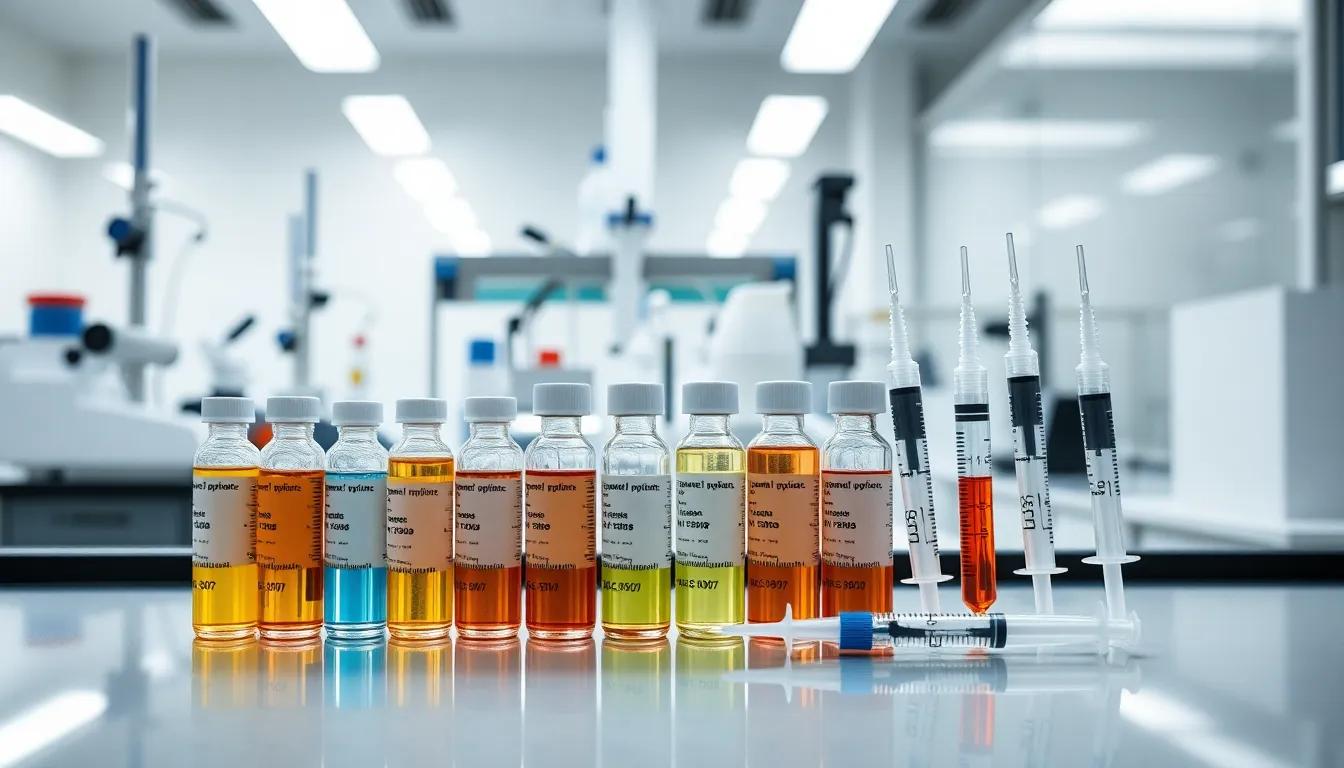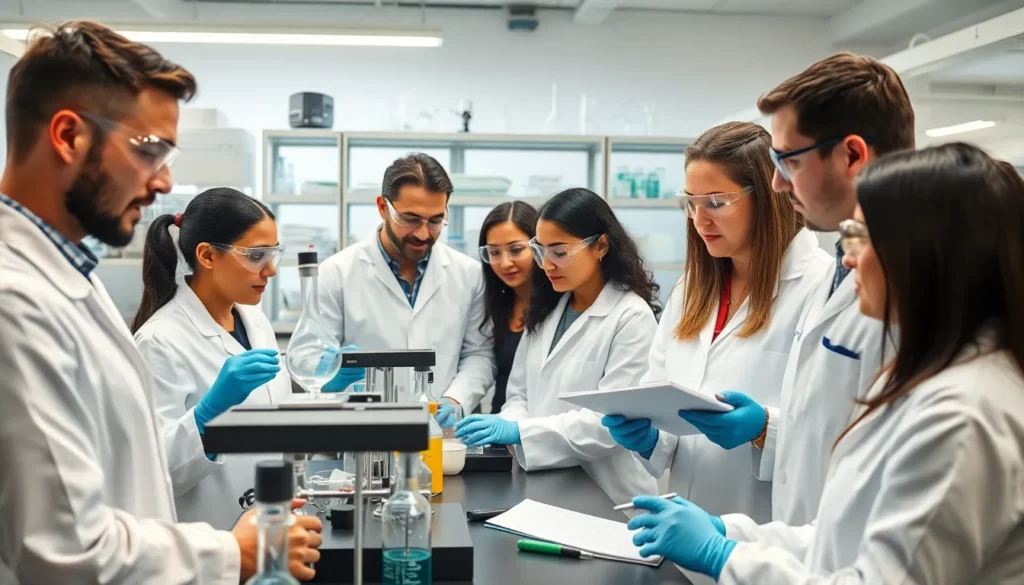Table of Contents
ToggleIn the ever-evolving world of biotechnology, peptides are the unsung heroes quietly revolutionizing health and wellness. Think of them as the tiny powerhouses that pack a punch, delivering targeted solutions for everything from aging to athletic performance. If you’ve ever wished for a magic potion to boost your body’s natural abilities, biotech peptides might just be the closest thing to it—minus the wizardry.
Overview Of Biotech Peptides
Biotech peptides consist of short chains of amino acids synthesized through advanced biotechnological methods. These compounds play a crucial role in numerous applications, including therapeutic treatments, cosmetic enhancements, and dietary supplements. They interact with biological systems, offering targeted effects that promote health and wellness.
Therapeutic peptides show promise in treating various medical conditions. Examples range from insulin peptides that regulate blood sugar levels to anti-inflammatory peptides that aid in recovery. Such applications underscore the versatility of biotech peptides in modern healthcare.
Cosmetic industries also leverage biotech peptides for skincare solutions. Antioxidant peptides help combat signs of aging, while collagen-boosting peptides improve skin elasticity and firmness. These properties make biotech peptides essential in cosmetic formulations aimed at enhancing skin health.
Dietary supplements often include biotech peptides to support athletic performance and recovery. Peptides derived from whey protein are popular among athletes for muscle repair and growth. Enhanced absorption rates associated with these peptides lead to improved nutrient delivery in the body.
Emerging research continues to unveil additional benefits of biotech peptides. Ongoing studies indicate potential anti-cancer effects and metabolic regulation among various peptide types. Advancements in peptide synthesis technology catalyze strides in research and application, opening new avenues for therapeutic solutions across multiple health disciplines.
Biotech peptides serve as essential tools in health sciences, offering innovative solutions to enhance human biology. Their multifunctional nature makes them valuable assets in medical and wellness sectors.
Types Of Biotech Peptides

Biotech peptides come in various forms, serving distinct applications across health and wellness fields.
Therapeutic Peptides
Therapeutic peptides play a vital role in modern medicine by offering targeted treatments for numerous conditions. Insulin peptides aid in blood sugar regulation, helping individuals manage diabetes effectively. Anti-inflammatory peptides support the body’s recovery processes, reducing pain and swelling after injuries. Furthermore, antimicrobial peptides provide defense against infections, enhancing immune responses. Each type showcases peptide versatility, highlighting how these compounds can serve as potent therapeutic agents.
Cosmetic Peptides
Cosmetic peptides enhance skincare solutions, focusing on improving overall skin health. Collagen-boosting peptides stimulate collagen production, leading to increased skin elasticity and reduced wrinkles. Antioxidant peptides protect skin cells from environmental damage, promoting a youthful appearance. Additionally, signaling peptides may encourage cell regeneration, further supporting skin vitality. Each of these peptides targets specific skin issues, showcasing their ability to transform cosmetic formulations into effective treatments.
Applications Of Biotech Peptides
Biotech peptides serve various applications in health and wellness, demonstrating their versatility in multiple sectors.
Drug Development
Therapeutic peptides play a vital role in drug development. They serve as targeted treatments for conditions like diabetes and cancer. Insulin peptides effectively regulate blood sugar levels, while hormone peptides can stimulate growth and development. Many pharmaceutical companies now focus on peptide-based therapies due to their specificity and lower toxicity. Researchers continually explore new peptide sequences to enhance efficacy and reduce side effects. Aspects such as bioavailability and stability also drive innovations in this area, leading to more effective drugs. This shift toward peptide therapeutics indicates a promising future in personalized medicine.
Anti-Aging Treatments
Biotech peptides significantly contribute to anti-aging treatments, addressing skin-related concerns effectively. Collagen-boosting peptides help improve skin elasticity, while antioxidant peptides protect skin cells from damage. Many formulations now include these peptides as key ingredients, enhancing youthful appearance. Additionally, signaling peptides promote cell regeneration, helping maintain skin vitality. Clinical studies highlight improvements in skin texture and reduction of fine lines with regular use. The growing popularity of peptide-infused cosmetics reflects the demand for effective anti-aging solutions in today’s market. This trend emphasizes the importance of peptides in promoting overall skin health.
Benefits Of Biotech Peptides
Biotech peptides offer numerous advantages across health and wellness sectors. Targeted therapeutic applications emerge from their ability to engage with specific biological systems. For instance, insulin peptides effectively regulate blood sugar levels, providing critical support for individuals with diabetes. Recovery from inflammation benefits from the action of anti-inflammatory peptides, which enhance healing processes.
Skincare solutions widely incorporate biotech peptides, reflecting their importance in the cosmetic industry. Collagen-boosting peptides play a vital role in improving skin elasticity and reducing wrinkles. Research confirms that antioxidant peptides protect skin cells from damage caused by environmental stressors, thus promoting overall skin health. Cell regeneration signals from certain peptides help maintain skin vitality, further enhancing aesthetic outcomes.
Athletic performance experiences support via the incorporation of biotech peptides in dietary supplements. Derived from whey protein, these peptides assist in muscle recovery and growth, helping athletes optimize their physical capabilities. Emerging data suggests potential anti-cancer effects linked to specific peptides, positioning them as a potential area of focus for future research.
Metabolic regulation benefits from the actions of biotech peptides as well. This innovative class of compounds shows promise in personalizing treatment strategies through targeted mechanisms. Patients encountering unique health challenges find hope in peptide-based therapies due to their specificity and lower toxicity profiles compared to traditional drugs.
Biotech peptides serve as powerful tools in enhancing human biology. Their therapeutic, cosmetic, and dietary applications demonstrate significant benefits, emphasizing their transformative potential across various sectors.
Challenges In Biotech Peptide Production
Biotech peptide production faces several significant challenges that affect efficiency and quality. One of the primary issues involves the complexity of peptide synthesis. Synthesis often requires precise control over reaction conditions, as variations can lead to impurities or incomplete products.
Purification of peptides presents another hurdle. Techniques such as high-performance liquid chromatography may be necessary, but they can become resource-intensive and time-consuming, especially for large-scale production. These purification processes not only increase costs but also add time to the overall production timeline.
Scale-up from laboratory to industrial production introduces additional difficulties. Maintaining consistency across batch sizes becomes crucial, but it often proves challenging due to variations in raw materials or equipment. Each of these factors can impact the final product’s quality significantly.
Stability also poses a challenge in biotech peptide production. Many peptides exhibit limited stability under certain conditions, leading to degradation and loss of activity over time. This unstable nature often complicates storage and transportation, necessitating special handling and storage conditions to maintain efficacy.
Regulatory compliance adds another layer of complexity. Biotech companies must navigate a labyrinth of regulations governing peptide development and production. Meeting these standards can slow down the process and increase operational costs.
Finally, competition in the biotech market constantly pushes for innovation and efficiency. Companies strive to develop new peptides or improve existing ones, but this often requires significant investment in research and development resources. Balancing product diversity with production efficiency remains a key challenge for those involved in biotech peptide production.
Biotech peptides are revolutionizing the landscape of health and wellness. Their versatility and effectiveness in therapeutic and cosmetic applications highlight their potential to address various health concerns. As research continues to uncover new benefits and applications, these peptides could play a crucial role in personalized medicine and innovative treatments.
However, the challenges in production and regulatory compliance require ongoing attention and innovation. The future of biotech peptides looks promising as they pave the way for advancements in health solutions and enhance overall well-being. Embracing these powerful tools may lead to significant breakthroughs in improving quality of life.







